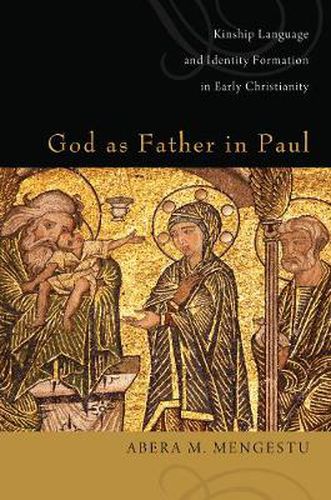Readings Newsletter
Become a Readings Member to make your shopping experience even easier.
Sign in or sign up for free!
You’re not far away from qualifying for FREE standard shipping within Australia
You’ve qualified for FREE standard shipping within Australia
The cart is loading…






This title is printed to order. This book may have been self-published. If so, we cannot guarantee the quality of the content. In the main most books will have gone through the editing process however some may not. We therefore suggest that you be aware of this before ordering this book. If in doubt check either the author or publisher’s details as we are unable to accept any returns unless they are faulty. Please contact us if you have any questions.
God as Father in Paul explores Paul’s use of the kinship term Father to refer to God, along with related familial terms (children of God and Christ-followers as brothers and sisters), as part of a study of the use of kinship language in the identity formation of early Christianity. Mengestu argues that these kinship terms are shared modes of identity constructions within the wider textual and cultural settings (the Roman Empire, the Roman Stoic philosophers, the Hebrew Bible, and ancient Jewish literature) from which Paul draws on as well as contests. Employing theoretical (kinship and social identity theory) as well as interpretative approaches (imperial critical and narrative approaches to Paul), he contends that Paul uses God as Father consistently, strategically, and purposefully, in both stable and crisis situations, to develop a narrative, orienting framework(s) that images the community of Christ-followers as a family that belongs to God, who, together with the Lord Jesus Christ, bestows on them equal but diverse membership in the family. The narrative so constructed forms the foundation for referring to Christ-followers as children of God and brothers and sisters of one another. It constructs boundaries and serves as nexus of transformation and negotiation.
$9.00 standard shipping within Australia
FREE standard shipping within Australia for orders over $100.00
Express & International shipping calculated at checkout
This title is printed to order. This book may have been self-published. If so, we cannot guarantee the quality of the content. In the main most books will have gone through the editing process however some may not. We therefore suggest that you be aware of this before ordering this book. If in doubt check either the author or publisher’s details as we are unable to accept any returns unless they are faulty. Please contact us if you have any questions.
God as Father in Paul explores Paul’s use of the kinship term Father to refer to God, along with related familial terms (children of God and Christ-followers as brothers and sisters), as part of a study of the use of kinship language in the identity formation of early Christianity. Mengestu argues that these kinship terms are shared modes of identity constructions within the wider textual and cultural settings (the Roman Empire, the Roman Stoic philosophers, the Hebrew Bible, and ancient Jewish literature) from which Paul draws on as well as contests. Employing theoretical (kinship and social identity theory) as well as interpretative approaches (imperial critical and narrative approaches to Paul), he contends that Paul uses God as Father consistently, strategically, and purposefully, in both stable and crisis situations, to develop a narrative, orienting framework(s) that images the community of Christ-followers as a family that belongs to God, who, together with the Lord Jesus Christ, bestows on them equal but diverse membership in the family. The narrative so constructed forms the foundation for referring to Christ-followers as children of God and brothers and sisters of one another. It constructs boundaries and serves as nexus of transformation and negotiation.